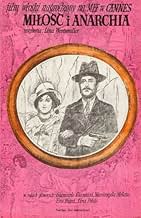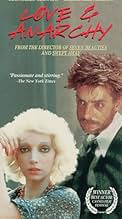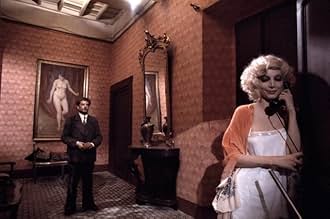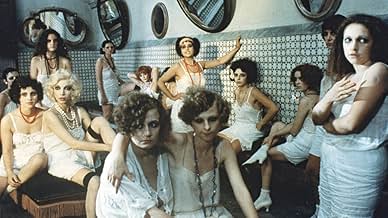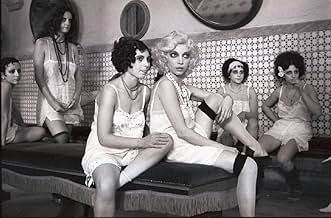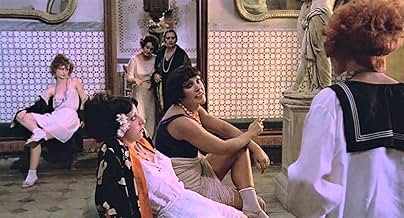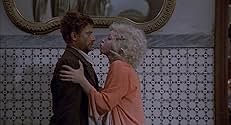Film d'amour et d'anarchie
Original title: Film d'amore e d'anarchia, ovvero 'stamattina alle 10 in via dei Fiori nella nota casa di tolleranza...'
IMDb RATING
7.7/10
3.7K
YOUR RATING
When a friend is murdered by the Facists, a melancholy farmer takes up residence in a Roman brothel as he and an anarchist prostitute plot to assassinate Mussolini.When a friend is murdered by the Facists, a melancholy farmer takes up residence in a Roman brothel as he and an anarchist prostitute plot to assassinate Mussolini.When a friend is murdered by the Facists, a melancholy farmer takes up residence in a Roman brothel as he and an anarchist prostitute plot to assassinate Mussolini.
- Awards
- 4 wins & 3 nominations total
- Director
- Writer
- All cast & crew
- Production, box office & more at IMDbPro
Featured reviews
Giannini is hilarious as a dim-witted hayseed anarchist, who, en route to assassinate Mussolini falls in love. An exuberant, vital, full throttle feast of a film, mostly set in a lusciously decadent Roman brothel, where Wertmuller, (who also wrote the very witty script) successfully directs the extraordinary (and excellently acted) characters through wild changes of mood, and juggles powerful politics, tender romance, horrible farce and tragedy with exceptional flair. Rotunno's photography is delicious; the unusually potent period atmosphere is splendidly captured by Enrico Job (Mr Wertmuller) and the music by Rota/Savina is perfect. Wertmuller at her most accessible.
10PWNYCNY
Excellent movie. Fast-paced, witty, earthy, entertaining dialog that tells a compelling story. That coupled with excellent acting, great continuity, and an unconventional setting makes this movie a special entertainment event. The movie also dramatizes the life of those on the margins of society and takes the audience on an emotional ride, generously spiced with conflict, arguments, squabbles, reconciliations and above all comradeship and friendship as the story takes a group of otherwise unsavory characters and elevates them to the level of real, but unsung, heroes who, hiding behind their masks of moodiness and bravado, have consciousness and really do care and are willing to act on it. Can a foulmouthed prostitute and a half-deranged peasant be heroes? Is a brothel a legitimate setting for hatching political conspiracies? Are those who society usually despises capable of heroism? This movie is about love and heroism and shows that even the most downtrodden are capable of great acts of personal selflessness. Great movie.
Rather than contend for film with the longest title, "Film of Love and Anarchy (or At Ten o'clock This Morning in Via dei Fiori in the Infamous House of Prostitution)" is better known by the more manageable "Love and Anarchy". This 1973 Lina Wertmüller thriller is a hard first watch because there is no suspense to grab the viewer and hook them into the story. I was only able to handle about 30 minutes at a time, not because it was unpleasant but because I was too uninvolved in the story to ignore distractions and interruptions. But while it withholds most of its appeal from the initial viewing, it yields something new each time it is viewed.
"Love and Anarchy" is more an expressionistic opera than a realistic thriller. Imagine "Cabaret" starring Charlie Chaplin's "Little Tramp" and you will have a good idea of its style.
It's main theme sneaks up and surprises you. U.S. viewers, dimly aware of the great depression and World War Two, suffer a complete cultural disconnect regarding the continuing legacy of fascism in Italy and Germany. Meaning that anti-fascist political messages are embedded in almost all post-war Italian cinema. But Wertmüller's "Love and Anarchy" has the broader theme of anti-extremism, taking shots at those who make major sacrifices out of perverted idealism and a lack historical perspective.
The film begins with its main character Tonino (Giancarlo Giannini) at a turning point in his life, the execution of an older relative for political subversion. After viewing the body on display in what would otherwise by an idyllic rural setting, Torino is inspired to take over what he perceives as his relative's mission, the assassination of Benito Mussolini.
Tonino goes to Rome and links up with his anarchist contact, a highly sought after call girl named Salomè (another Wertmuller regular Mariangela Melato), her brothel is popular with the Fascists and Mussolini's head of security, an arrogant blow-hard named Spatoletti (Eros Pagni), is especially fond of Salomè.
Tonino and young call girl Tripolina (Lina Polito) soon fall in love which serves to greatly complicate his mission.
I watched the widescreen version of the film on the Fox Lorber DVD, and contrary to several other comments I found no problems with the film transfer. My guess is that these refer to the variation in color tone as the film cuts between characters, but this is a deliberate effect by Wertmüller's. She lights each face differently to convey the character's motivation. The uncomplicated Torino is given natural lighting, the political Salomè is tinted red, and the disillusioned Tripolina is in shadow. These combine with bold colors, a surreal score, and acute camera angles that exaggerate elements and play with scale in many of the frames. The everyday scenes in the brothel are especially good, combining the audacious with the darkly comic. The best is a carnival-like montage to music showcasing the start of a busy day of business for the prostitutes and their eager customers.
In almost any other film Pagni would steal the whole thing with his overplayed performance but Melato matches him line for line. This contrasts nicely with the more subtle and nuanced performances of Giannini and Polito. Polito is very effective when Wertmüller makes use of her eyes in several close-ups.
There is much overwrought melodrama as Wertmüller uses a farcical tone to illustrate that the Fascists and their opposition are linked by a common hypocrisy and a shared perversion of idealism. Ironically the film is at its best during its quiet scenes such as Tornio and Tripolina's stroll through the plazas of the city.
This is an important film with an original message, fine performances from the entire ensemble, and really slick film-making techniques.
Then again, what do I know? I'm only a child.
"Love and Anarchy" is more an expressionistic opera than a realistic thriller. Imagine "Cabaret" starring Charlie Chaplin's "Little Tramp" and you will have a good idea of its style.
It's main theme sneaks up and surprises you. U.S. viewers, dimly aware of the great depression and World War Two, suffer a complete cultural disconnect regarding the continuing legacy of fascism in Italy and Germany. Meaning that anti-fascist political messages are embedded in almost all post-war Italian cinema. But Wertmüller's "Love and Anarchy" has the broader theme of anti-extremism, taking shots at those who make major sacrifices out of perverted idealism and a lack historical perspective.
The film begins with its main character Tonino (Giancarlo Giannini) at a turning point in his life, the execution of an older relative for political subversion. After viewing the body on display in what would otherwise by an idyllic rural setting, Torino is inspired to take over what he perceives as his relative's mission, the assassination of Benito Mussolini.
Tonino goes to Rome and links up with his anarchist contact, a highly sought after call girl named Salomè (another Wertmuller regular Mariangela Melato), her brothel is popular with the Fascists and Mussolini's head of security, an arrogant blow-hard named Spatoletti (Eros Pagni), is especially fond of Salomè.
Tonino and young call girl Tripolina (Lina Polito) soon fall in love which serves to greatly complicate his mission.
I watched the widescreen version of the film on the Fox Lorber DVD, and contrary to several other comments I found no problems with the film transfer. My guess is that these refer to the variation in color tone as the film cuts between characters, but this is a deliberate effect by Wertmüller's. She lights each face differently to convey the character's motivation. The uncomplicated Torino is given natural lighting, the political Salomè is tinted red, and the disillusioned Tripolina is in shadow. These combine with bold colors, a surreal score, and acute camera angles that exaggerate elements and play with scale in many of the frames. The everyday scenes in the brothel are especially good, combining the audacious with the darkly comic. The best is a carnival-like montage to music showcasing the start of a busy day of business for the prostitutes and their eager customers.
In almost any other film Pagni would steal the whole thing with his overplayed performance but Melato matches him line for line. This contrasts nicely with the more subtle and nuanced performances of Giannini and Polito. Polito is very effective when Wertmüller makes use of her eyes in several close-ups.
There is much overwrought melodrama as Wertmüller uses a farcical tone to illustrate that the Fascists and their opposition are linked by a common hypocrisy and a shared perversion of idealism. Ironically the film is at its best during its quiet scenes such as Tornio and Tripolina's stroll through the plazas of the city.
This is an important film with an original message, fine performances from the entire ensemble, and really slick film-making techniques.
Then again, what do I know? I'm only a child.
I saw this movie in the 1980s but it remains an all time favourite. It is a terrific story with a range of characters who demonstrate extremes of character. The women are sexy and smart and they are critical to the story. The music by Nino Rota is wonderful and delicately placed within the story. There are many memorable scenes. The stars Giancarlo Giannini, Mariangela Melato, and Lina Polito are perfect for their roles and there are many other notables including Eros Pagni who is the brute given charge of the black shirts. I've watched this film at least a dozen times and I plan to watch it many more before I return to the earth. I commend Love and Anarchy to you.
The well-regarded director Wertmuller made this movie which is a slow study into how brutality and violence can be saved my love in my opinion. It is very operatic which is how she chose to attack it. The direction, I can say is flawless but the movie feels incomplete. First, I am more the director who uses visual images rather than hammy stagey dialogue to tell their stories. Carnini is the only actor who does not use a pantomime, overexagerrated style in the movie until the very end, while everybody else does. It softens the impact of the movie as it is the quieter moments that carry real weight. The style of direction is very narchiac with wonderful wide shots and good editing creating an effigy of exuberance over the picture. Most of the picture set in an italian bordello where the fascists of italy stay is a place for both love between carnini and pesilamo. Images are beautiful, and certain individual scenes work while others don't. We are left with a great understanding of what love must feel like but the brutality of man is never explained. It esssentially sets up the theory that all fascists are naturally evil. The ending tells us it is the stoty of one man while the movie sets it up as the story of every man. This the best explanation I can give without speaking too much about its plot. Wertmuller was much better in Swept away and seven beauties. But for an introduction to Wertmuller, and arty Italian cinema of the sixties and seventies which dealt very operaticly with evils of fascism.
Did you know
- TriviaErrico Malatesta, who is quoted at the end of the film, was an Italian anarchist propagandist and revolutionary socialist. He edited several radical newspapers and spent much of his life exiled and imprisoned, having been jailed and expelled from Italy, England, France, and Switzerland. After World War I, he returned to Italy where his Umanità Nova, an anarchist newspaper, had some popularity before its closure under the rise of Mussolini. Malatesta was a committed revolutionary. He believed that the anarchist revolution was inevitable and that violence would be a necessary part of it since the state rested ultimately on violent coercion.
- Crazy creditsBefore end credits: "I wish to repeat my horror that attacks, which besides being bad in and of themselves are also stupid, because they harm the very cause they are trying to serve...But those assassins are also saints and heroes...And they will be celebrated once the brutal facts are forgotten, and all that is remembered is the idea that inspired them and the martyrdom that made them saints.--Errico Malatesta."
- Alternate versionsFor the initial American release, editor Fima Noveck created a prologue which featured a montage of photos of Mussolini, along with a crawl explaining his rise to power and the violent activities sanctioned in his name during his reign.
- ConnectionsFeatured in Dietro gli occhiali bianchi (2015)
- How long is Love & Anarchy?Powered by Alexa
Details
- Release date
- Countries of origin
- Language
- Also known as
- Love & Anarchy
- Filming locations
- Parrocchia Santissima Annunziata, Piazza Reg. Margherita, 6, 04016 Sabaudia LT, Italy(Tunin cases the outside of the church)
- Production companies
- See more company credits at IMDbPro
Box office
- Gross worldwide
- $965
- Runtime2 hours 4 minutes
- Sound mix
- Aspect ratio
- 1.85 : 1
Contribute to this page
Suggest an edit or add missing content

Top Gap
By what name was Film d'amour et d'anarchie (1973) officially released in India in English?
Answer

